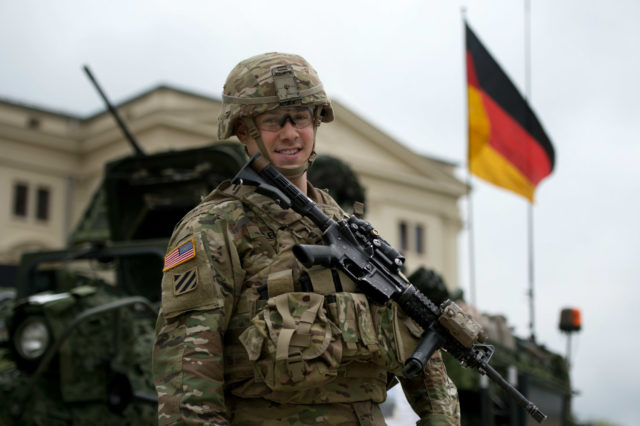The first troop reductions in Germany under President Donald Trump’s order have taken place, and many in the national security community are aghast, even The Wall Street Journal.
The President based his decision on Germany’s failure to contribute adequately to NATO defense, flouting an agreed on 2% (of GDP) threshold for national defense contributions, but the story – like the alliance – is more complicated.
NATO requires consensus. The validity of the alliance hangs on whether states would be willing to approve a military response to a Russian action against any NATO member. Without it, the U.S. would lack the ability to use NATO airfields in Germany, Italy, Turkey, and the UK. It would not have permission for ground forces to transit much of western Europe.
Today, Germany’s military is a shambles. It has few operational tanks, not very many aircraft, and a navy in serious decline. But the Germans really don’t care. Because Germany is Russia’s biggest paying customer for natural gas, Berlin believes there is no incentive for the Russians to bother it.
If there is a threat to outliers such as Poland or the Baltic States, Germany is far from committed to responding. There is a strong likelihood that Germany would veto any NATO response to a (highly unlikely) Russian aggression outside of a direct attack on Germany itself. If Germany uses its veto, France and Italy will likely align with it. So too would Turkey, increasingly estranged from NATO.
Thus, even without any troop pullback by the United States, NATO has reached a precarious point as a collective security alliance.
Objectively, the U.S. is a nuclear power with a weakened conventional defense capability. Years of wasteful wars in Iraq, Afghanistan, and other hotspots have worn out conventional U.S. hardware (aircraft, ships, tanks, artillery), reduced our stockpile of munitions, especially smart weapons, and made many of our warfighters bitter about being in conflicts that sap lives and offer no compensation in victory.
From a defense planner’s perspective, any engagement of U.S. forces in Europe might break the back of our armed forces, and seriously weaken our already short-handed response to China’s growing power and assertiveness. A good analyst would argue to rebuild our forces over the next two decades before America gets into any more quagmires or engages a major power. This means that hanging onto the status quo and selective enhancements is about the best the U.S. can do in the middle future to protect our vital security interests. And, indeed, that is what the administration’s 2021 Defense Budget document calls for.
There were two rationales for NATO when it was originally set up; collective defense was not one of them. It was patently obvious the U.S. would provide the bulk of any effort to protect Europe. The others would do what they could, which was never much.
The initial reason for NATO was to form an ironclad alliance to prevent Europeans from starting World War III. The American troop presence in Europe blocked Germany from being a hostile and dangerous aggressive power, as it was after World War I when a peace settlement failed to change its expansionist behavior, and after World War II when in the U.S. army was the bulwark against another Hitler.
The second reason for NATO was to stop Russia from being even more greedy and, to a degree, to cover up President Franklin Roosevelt’s decision to acquiesce in Russia’s domination of Eastern Europe.
What changed the equation was that the American nuclear umbrella ceased to be unilateral when Russia exploded its first atomic bomb in 1949. In the period from the 1960s through the 1980s, there developed in Europe an increasing skepticism that the U.S. would use its nuclear arsenal to defend against Russia. In large measure, European suspicions were correct — which explains France’s Force de Frappe and the UK’s nuclear bombs and missile-firing nuclear submarines. (Even the Germans and the Italians wanted nuclear weapons but withered under U.S. pressure and backed off. Instead, they sold their nuclear technology to Iraq, Pakistan, Syria, Iran, and others.)
Today, the danger of a general war on the continent still deters Russia, Europe, and the United States. But a nuclear deterrent probably is meaningless in smaller land grab operations, most of which are almost impossible to prevent. One reason Russia occupies about 20 percent of Georgia, and Ukraine is being swallowed in chunks, is that no one in Europe, or the United States, is willing – or able? – to pay a real price to stop Vladimir Putin.
In practical terms, the U.S. should worry less about NATO and instead see what it can do to bolster at least some of the most vulnerable and strategic post-communist European states. At the same time, the U.S. has to be cautious that in doing so it is not put into a costly and risky trap.
The best candidate for defense is Poland because the Poles are making serious investments in their security and because they welcome bilateral cooperation with the U.S. as a bulwark against their traditional enemy, Russia. While NATO is unlikely to support it in a crisis, the opposite is the case with the United States, although it won’t be simple.
There is always the chance that the Europeans will reverse course, but there is little evidence the current crop of European leaders believes in NATO beyond lip service. Under current conditions, then, NATO is reaching its end as a collective security system.
Given the nearly fatal condition of NATO, President Trump’s pullout of troops has no actual impact on the balance of forces in Europe. But the decision sends a message to Western European countries that if they want to defend themselves, they had better get started.






